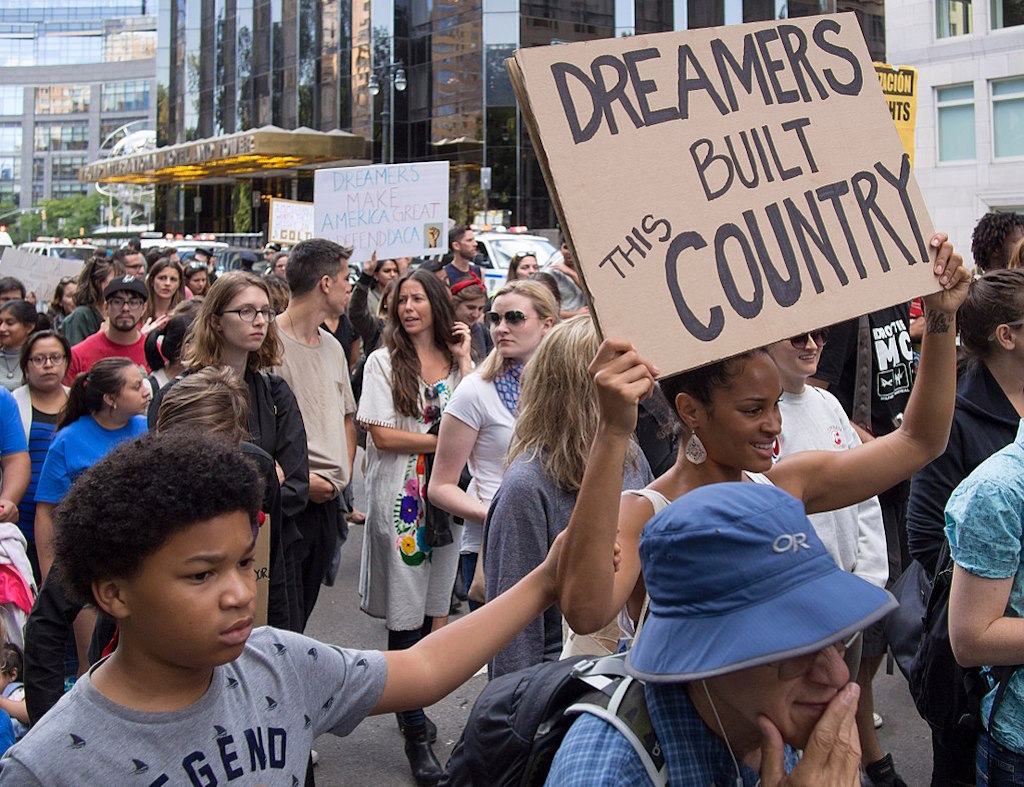For Some Democrats, Civic Engagement Is Replacing Religion
A new poll suggests that among Democratic voters, the most civically engaged are the least religious. A 2017 protest in New York City in response to the rescission of the Deferred Action for Childhood Arrivals program. (Rhododendrites / Wikimedia Commons)
A 2017 protest in New York City in response to the rescission of the Deferred Action for Childhood Arrivals program. (Rhododendrites / Wikimedia Commons)
Over 4 million people attended the Women’s March in Washington, D.C., following President Trump’s inauguration in 2017. The week afterward, thousands flocked to airport protests against the first version of the executive order that banned residents from seven majority-Muslim countries. “The election of Donald Trump,” NPR reported in March 2017, “ignited progressive activism at a rate never seen before in American politics.”
As often happens within the losing party after an election, Democrats are more engaged and organized, but what’s surprising this time, according to a new poll from The Atlantic and the Public Religion Research Institute (PRRI), is the particular segment of Democrats who are most engaged: the nonreligious.
As Emma Green writes in The Atlantic, “religiously unaffiliated Democrats were more than twice as likely to have attended a rally within the past 12 months compared with their religious peers. During that time, they were significantly more likely to have contacted an elected official or to have donated to a candidate or cause.”
Their collective phone calls, donations and even Facebook posts are reshaping their party.
Dan Cox, research director at PRRI, told The Atlantic that “[c]ulturally, this is the subgroup of the Democratic Party that feels most at odds with the direction of the country and what the Trump administration is doing. … These secular Democrats also tend to be the most liberal.”
Democrats, as Green explains, used to have a reliable base of religious voters: “A decade ago, more than 80 percent of self-identified Democrats were affiliated with some sort of religion, according to the Pew Research Center.” By 2014, a Pew poll found that 28 percent of Democrats identified as religiously unaffiliated.
In addition to being nonreligious, this group is, Green observes, “elite, politically plugged-in, constantly discussing the Republicans’ latest political shenanigans at dinner parties—and more focused on national problems than local affairs.” But as much as this group enjoys going to protests and discussing politics online, researchers are unsure whether it will add up to an increase in votes.
As Eitan Hersh, a political scientist at Tufts University, told The Atlantic, “You see Democrats who will say on surveys that their most important issues are the environment or racial equality,” but, he continued, “they take absolutely no interest in voting in local primaries or local municipal elections, where a lot of those issues are worked out. … It’s a lot more gratifying to be talking about the Kavanaugh hearing.”
Politics, and especially the political internet, may be a replacement for the community and sense of identity religion once provided. As Hersh observes, “This online world of political identity … is basically acting as a replacement for people who maybe a generation or two before would identify as Catholic or as Jewish or as Irish or Italian.”
Read The Atlantic’s analysis and the full study here.
Your support matters…
Independent journalism is under threat and overshadowed by heavily funded mainstream media.
You can help level the playing field. Become a member.
Your tax-deductible contribution keeps us digging beneath the headlines to give you thought-provoking, investigative reporting and analysis that unearths what's really happening- without compromise.
Give today to support our courageous, independent journalists.






You need to be a supporter to comment.
There are currently no responses to this article.
Be the first to respond.